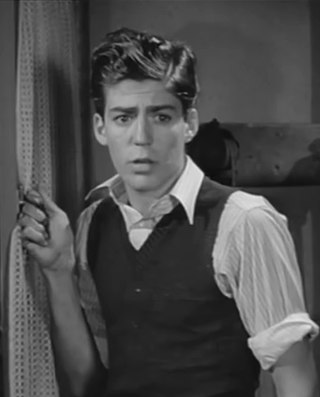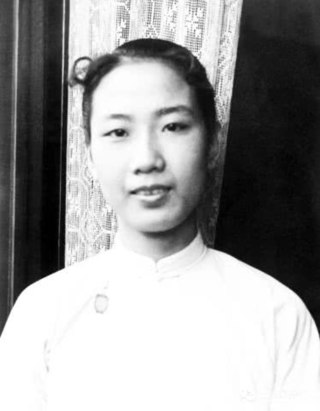Related Research Articles

David O. Selznick was an American film producer, screenwriter and film studio executive who produced Gone with the Wind (1939) and Rebecca (1940), both of which earned him an Academy Award for Best Picture. He also won the Irving Thalberg Award at the 12th Academy Awards, Hollywood's top honor for a producer, in recognition of his shepherding Gone with the Wind through a long and troubled production and into a record-breaking blockbuster.
Robert Edwin Lee was an American playwright and lyricist. In the early years of World War II, Lee partnered with Jerome Lawrence to create Armed Forces Radio while serving together in the U.S. Army. Lawrence and Lee became the most prolific writing partnership in radio, with such long-running series as Favorite Story among others.

The Ealing comedies is an informal name for a series of comedy films produced by the London-based Ealing Studios during a ten-year period from 1947 to 1957. Often considered to reflect Britain's post-war spirit, the most celebrated films in the sequence include Kind Hearts and Coronets (1949), Whisky Galore! (1949), The Lavender Hill Mob (1951), The Man in the White Suit (1951) and The Ladykillers (1955). Hue and Cry (1947) is generally considered to be the earliest of the cycle, and Barnacle Bill (1957) the last, although some sources list Davy (1958) as the final Ealing comedy. Many of the Ealing comedies are ranked among the greatest British films, and they also received international acclaim.

William Halop was an American actor.

Victoria Hopper was a Canadian-born British stage and film actress and singer.
Antigone, also known as The Antigone of Sophocles, is an adaptation by the German dramatist Bertolt Brecht of Hölderlin's translation of Sophocles' tragedy. It was first performed at the Chur Stadttheater in Switzerland in 1948, with Brecht's second wife Helene Weigel, in the lead role. This was Brecht's first directorial collaboration with Caspar Neher.

Rochelle Bass Owens is an American poet and playwright.

Yuan Xuefen was a noted performer in the Yue opera genre of Chinese opera. She has been called "arguably the most important actress in the recent history of Yueju [Shaoxing] opera". The only other artist to be ranked with her is Fu Quanxiang.
Renee Gertrude Gadd was an Argentine-born British film actress. She acted mostly in British films.

Pictures from the Insects' Life – also known as The Insect Play, The Life of the Insects, The Insect Comedy, The World We Live In and From Insect Life – is a satirical play that was written in Czech by the Brothers Čapek, who collaborated on 4 stage works, of which this is the most famous. It was published in 1921 and premiered in 1922.

White Face is a 1932 British crime film directed by T. Hayes Hunter and starring Hugh Williams, Gordon Harker and Renee Gadd. The film is based on a play by Edgar Wallace.

Margherita Cecilia Brigida Lucia Maria Albanesi was a British stage and film actress.
Autumn Crocus is a 1931 play by the British writer Dodie Smith. It was Smith's first play written under the pseudonym of C.L. Anthony. It follows a single schoolteacher who goes on holiday to the Tyrol and falls in love with the married owner of the hotel in which she is staying.
Loyalties is a 1922 play by the British writer John Galsworthy. It was staged at St Martins Theatre and ran for over a year. Galsworthy described it as "the only play of mine which I was able to say, when I finished it, no manager will refuse this". The original West End cast included Ernest Milton, Edmund Breon, Eric Maturin, Malcolm Keen, Ian Hunter, Cathleen Nesbitt, Beatrix Thomson and Meggie Albanesi.

The Constant Nymph is a 1933 British drama film directed by Basil Dean and starring Victoria Hopper, Brian Aherne and Leonora Corbett. It is an adaptation of the 1924 novel The Constant Nymph by Margaret Kennedy and the 1926 stage play adaptation written by Kennedy and Dean. Dean tried to persuade Novello to reprise his appearance from the 1928 silent version The Constant Nymph but was turned down and cast Aherne in the part instead.
Mr. Wu is a 1919 British drama film directed by Maurice Elvey and starring Matheson Lang, Roy Royston, Lillah McCarthy and Meggie Albanesi. It was based on a 1913 play Mr. Wu by Maurice Vernon and Harold Owen. During the filming Albanesi became infatuated with Lang. The picture was made by Stoll Pictures, and was one of their first major successes. Lon Chaney played the title role in a 1927 remake. The screenplay concerns a Chinese Mandarin who murders his daughter.

Cocaine is a 1922 British crime film directed by Graham Cutts and starring Hilda Bayley, Flora Le Breton, Ward McAllister and Cyril Raymond. It depicts the distribution of cocaine by gangsters through a series of London nightclubs and the revenge a man seeks after his daughter's death.

Young Woodley is a 1925 play by the British writer John Van Druten. It concerns a schoolboy at a top British public school who falls in love with his headmaster's wife and is eventually expelled. Because of its negative depiction of public school life, and its controversial subject matter, the play originally was banned in the United Kingdom and only staged in 1928. However, it was a major success in the United States, and Van Druten moved there to work. The ban in Britain was lifted, and the play ran for over 400 performances in the West End, making a star of its lead Frank Lawton. It was revived at the Finborough Theatre, London, in 2007. It was included in Burns Mantle's The Best Plays of 1925-1926.
Spanish Eyes is a 1930 British musical film directed by G. B. Samuelson and starring Anthony Ireland, Donald Calthrop and Dennis Noble. It had a gypsy theme and was made at Twickenham Studios in West London. The film was made at night, to allow other more important productions to use the studio in the daytime - a common practice at Twickenham during the era.
Rachael Low was a British film historian, best known as the author of the seven-volume The History of the British Film.
References
- ↑ Cody & Sprinchorn p.30
- ↑ Sweet p.142-143
- ↑ The Cumberland News, June 3rd 1948, p28
- ↑ "Hollywood", Milwaukee Sentinel, July 6th 1948, p10
- ↑ "Panáček v říši mluveného slova". 2005.